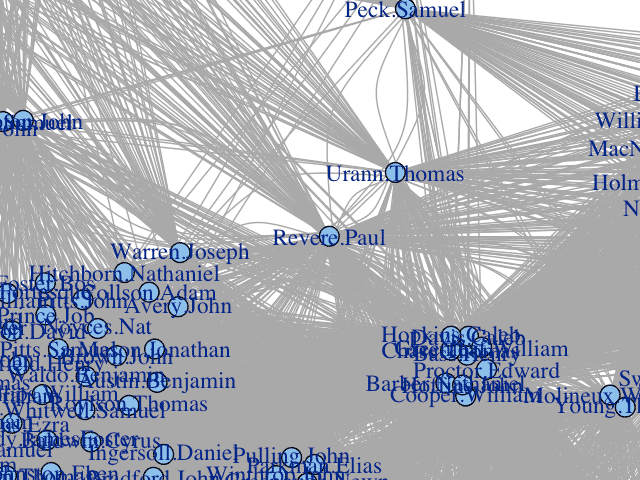PRISM in the 18th century

There’s been a lot of discussion recently about government programs like PRISM and how, according to defenders of such surveillance, they “only” collect metadata related to communications and not the content of the communication. In a clever article, Kieran Healy uses only the membership lists of various Boston-area organizations in the late 1770s to find out quite a lot about who might be the leaders of the nascent revolutionary cell. Even with this simple analysis, Paul Revere’s name pops out of the data.
The analytical engine has arranged everyone neatly, picking out clusters of individuals and also showing both peripheral individuals and-more intriguingly-people who seem to bridge various groups in ways that might perhaps be relevant to national security. Look at that person right in the middle there. Zoom in if you wish. He seems to bridge several groups in an unusual (though perhaps not unique) way. His name is Paul Revere.
Once again, I remind you that I know nothing of Mr Revere, or his conversations, or his habits or beliefs, his writings (if he has any) or his personal life. All I know is this bit of metadata, based on membership in some organizations. And yet my analytical engine, on the basis of absolutely the most elementary of operations in Social Networke Analysis, seems to have picked him out of our 254 names as being of unusual interest.
Now, the Crown may have suspected Revere of anti-Royalist leanings without this analysis. But with the analysis, they all but know. Get Revere and a few other highly connected nodes into jail on some trumped-up charges and, voila, maybe the American Revolution never happens or is quickly quashed. Revere and the American Revolution is an extreme example of what Moxie Marlinspike is getting at in We Should All Have Something To Hide: that breaking the law is sometimes how society moves forward.
Over the past year, there have been a number of headline-grabbing legal changes in the US, such as the legalization of marijuana in CO and WA, as well as the legalization of same-sex marriage in a growing number of US states.
As a majority of people in these states apparently favor these changes, advocates for the US democratic process cite these legal victories as examples of how the system can provide real freedoms to those who engage with it through lawful means. And it’s true, the bills did pass.
What’s often overlooked, however, is that these legal victories would probably not have been possible without the ability to break the law.
The state of Minnesota, for instance, legalized same-sex marriage this year, but sodomy laws had effectively made homosexuality itself completely illegal in that state until 2001. Likewise, before the recent changes making marijuana legal for personal use in WA and CO, it was obviously not legal for personal use.
Imagine if there were an alternate dystopian reality where law enforcement was 100% effective, such that any potential law offenders knew they would be immediately identified, apprehended, and jailed. If perfect law enforcement had been a reality in MN, CO, and WA since their founding in the 1850s, it seems quite unlikely that these recent changes would have ever come to pass. How could people have decided that marijuana should be legal, if nobody had ever used it? How could states decide that same sex marriage should be permitted, if nobody had ever seen or participated in a same sex relationship?





Stay Connected